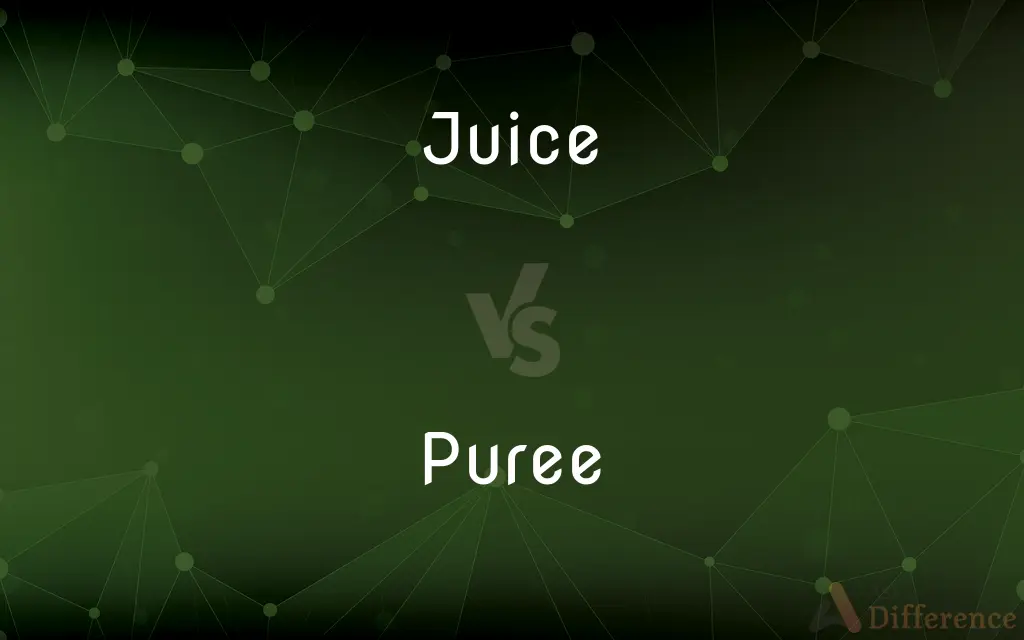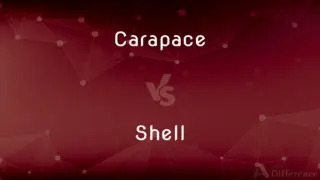Juice vs. Puree — What's the Difference?
By Tayyaba Rehman & Urooj Arif — Updated on April 2, 2024
Juice is extracted liquid from fruits or vegetables, focusing on flavor and nutrients, while puree is blended into a smooth consistency, retaining fiber and pulp.

Difference Between Juice and Puree
Table of Contents
ADVERTISEMENT
Key Differences
Juice typically involves extracting the liquid part from fruits or vegetables, leaving behind most of the solid matter such as pulp and seeds. This process maximizes the concentration of vitamins and minerals, making juice a popular choice for those seeking a quick nutritional boost. On the other hand, puree is made by blending whole fruits or vegetables into a thick, smooth substance. This method retains more of the fiber and nutrients contained in the skins and pulp, offering a different texture and nutritional profile.
While juice is often consumed as a beverage for hydration and a quick intake of nutrients, puree serves as a versatile ingredient in cooking and baking, providing flavor, texture, and moisture to various dishes. Purees can be used as a base for soups, sauces, and baby foods, showcasing their adaptability in culinary applications.
The production of juice typically requires specialized equipment such as juicers or cold presses, which separate the juice from the solid components. Conversely, purees can be made using more common kitchen appliances like blenders or food processors, making them accessible to a broader audience.
In terms of storage and shelf life, juice, especially when freshly squeezed, tends to have a shorter shelf life due to its susceptibility to oxidation and microbial growth. Purees, when cooked or properly stored, can last longer and often freeze well, offering more flexibility for future use.
Both juice and puree offer unique health benefits. Juice provides a concentrated source of vitamins and minerals, which can be beneficial for individuals needing a quick nutrient uptake. However, due to the lack of fiber, juices can have a high glycemic index. Purees, with their retained fiber, can aid in digestion and provide a slower, more sustained release of energy.
ADVERTISEMENT
Comparison Chart
Composition
Liquid extracted, solid matter removed
Blended into a smooth consistency, retains fiber
Primary Use
Beverage, nutritional intake
Ingredient in cooking and baking, baby food
Nutritional Content
Higher in vitamins/minerals, less fiber
Retains more fiber, vitamins, and minerals
Equipment Needed
Juicers, cold presses
Blenders, food processors
Shelf Life
Shorter, prone to oxidation
Longer, can be frozen
Compare with Definitions
Juice
A liquid extracted from fruits or vegetables.
Orange juice is a popular breakfast beverage.
Puree
Blended fruits or vegetables into a smooth consistency.
The tomato puree was the base for the sauce.
Juice
Made using juicers or cold presses.
We use a cold press to make our juice to preserve nutrients.
Puree
Used as a versatile cooking ingredient.
I use pumpkin puree to make both soup and pie.
Juice
Lacks fiber compared to puree.
Juice cleanses are popular, though they lack dietary fiber.
Puree
Can be made with common kitchen appliances.
I pureed the berries using a standard blender.
Juice
Has a shorter shelf life.
Freshly squeezed juice should be consumed within 24 hours.
Puree
Offers a different texture and nutritional profile.
Adding beet puree to cakes enhances color and nutrition.
Juice
Consumed for hydration and nutrients.
After my run, I had a glass of carrot juice to replenish.
Puree
Retains fiber and nutrients.
Apple puree in the recipe adds moisture and fiber.
Juice
Juice is a drink made from the extraction or pressing of the natural liquid contained in fruit and vegetables. It can also refer to liquids that are flavored with concentrate or other biological food sources, such as meat or seafood, such as clam juice.
Puree
To rub through a strainer or process (food) in a blender.
Juice
A fluid naturally contained in plant or animal tissue
Fruit juice.
Meat braised in its own juices.
Puree
Food prepared by straining or blending.
Juice
A bodily secretion
Digestive juices.
Puree
A food that has been ground or crushed into a thick liquid or paste.
Tomato sauce is generally a puree.
Juice
The liquid contained in something that is chiefly solid.
Puree
A type of unleavened bread from South Asia.
Juice
A beverage made from fruit juice or fruit-flavored syrup that is often combined with sweeteners, water, or other ingredients.
Puree
To crush or grind food into a puree.
Juice
A substance or quality that imparts identity and vitality; essence.
Puree
A dish made by boiling any article of food to a pulp and rubbing it through a sieve; as, a purée of fish, or of potatoes; especially, a soup the thickening of which is so treated.
Juice
(Slang) Vigorous life; vitality.
Puree
Food prepared by cooking and straining or processed in a blender
Juice
(Slang) Political power or influence; clout.
Puree
Rub through a strainer or process in an electric blender;
Puree the vegetables for the baby
Juice
Electric current.
Juice
Fuel for an engine.
Juice
(Slang) Funds; money.
Juice
Alcoholic drink, especially liquor.
Juice
A substance, such as a steroid, taken to enhance performance in an athletic event.
Juice
A usually flavored liquid prepared for use in an e-cigarette or similar device.
Juice
(Slang) Racy or scandalous gossip.
Juice
To extract the juice from.
Juice
To drink alcoholic beverages excessively.
Juice
To take a steroid or other substance to enhance athletic performance.
Juice
(uncountable) A liquid from a plant, especially fruit.
Squeeze the orange and some juice will come out.
Juice
(countable) A beverage made of juice.
I’d like two orange juices please.
Juice
(uncountable) Any liquid resembling juice.
Moo juice
Juice
(Scotland) A soft drink.
Juice
Liquor.
Juice
(informal) The liquid that is used to submerge a substance kept in a container
[[sauerkraut juice (the brine in a jar of sauerkraut)
Juice
(slang) The leftover liquid of some wet or damp substance.
Dumpster juice (liquid which oozes out of garbage dumpsters)
Juice
Vitality, strength.
Juice
Political power.
Juice
Petrol; gasoline.
Juice
Electricity.
Juice
Steroids.
Juice
Semen.
Juice
The amount charged by a bookmaker for betting services.
Juice
Musical agreement between instrumentalists.
Juice
(transitive) To extract the juice from something.
Juice
(transitive) To energize or stimulate something.
Juice
To take a performance-enhancing drug.
Juice
Alternative spelling of Jew's (used in certain set phrases like juice harp)
Juice
The characteristic fluid of any vegetable or animal substance; the sap or part which can be expressed from fruit, etc.; the fluid part which separates from meat in cooking.
An animal whose juices are unsound.
The juice of July flowers.
The juice of Egypt's grape.
Letters which Edward Digby wrote in lemon juice.
Cold water draws the juice of meat.
Juice
To moisten; to wet.
Juice
The liquid part that can be extracted from plant or animal tissue
Juice
Energetic vitality;
Her creative juices were flowing
Juice
Electric current;
When the wiring was finished they turned on the juice
Juice
Any of several liquids of the body;
Digestive juices
Common Curiosities
Can you make juice without a juicer?
Yes, juice can be made using a blender followed by straining, but a juicer is more efficient for extracting liquid.
Can purees be used in drinks?
Yes, purees can be used in smoothies, cocktails, and other beverages to add texture and flavor.
How long can you store homemade juice?
Homemade juice should be consumed within 24-48 hours for optimal freshness.
Is puree healthier than juice?
Puree can be healthier than juice due to its fiber content, which aids in digestion and provides a more sustained energy release.
Why does juice have a shorter shelf life?
Juice has a shorter shelf life due to its higher susceptibility to oxidation and microbial growth.
Can you freeze puree?
Yes, purees often freeze well, making them convenient for future use.
Is juicing better for nutrient intake?
Juicing can provide a more concentrated nutrient intake, but it lacks the dietary fiber found in purees.
What equipment is best for making puree?
A blender or food processor is typically used for making puree.
Can I use puree as a substitute for fresh fruits in recipes?
Yes, purees can substitute fresh fruits in many recipes, offering a concentrated flavor and moisture.
Are there any fruits or vegetables that are better juiced than pureed?
Citrus fruits and leafy greens are often better juiced, as their purees can be too fibrous or bitter.
What is the main difference between juice and puree?
Juice is a liquid extracted from fruits or vegetables, while puree is a thick, smooth blend of whole fruits or vegetables.
How can I preserve homemade juice for longer?
Homemade juice can be preserved longer by refrigeration and using airtight containers, although consumption within a few days is recommended.
Is it necessary to cook purees?
It's not always necessary to cook purees, but cooking can enhance flavor, texture, and shelf life.
How does the texture of juice compare to that of puree?
Juice has a liquid consistency suitable for drinking, while puree is thicker and smoother, ideal for eating with a spoon or mixing into recipes.
Do all juices lack fiber?
Yes, by definition, juice lacks the fiber found in the whole fruit or vegetable since the fiber is removed during the juicing process.
Share Your Discovery

Previous Comparison
Carapace vs. Shell
Next Comparison
Imperium vs. EmpireAuthor Spotlight
Written by
Tayyaba RehmanTayyaba Rehman is a distinguished writer, currently serving as a primary contributor to askdifference.com. As a researcher in semantics and etymology, Tayyaba's passion for the complexity of languages and their distinctions has found a perfect home on the platform. Tayyaba delves into the intricacies of language, distinguishing between commonly confused words and phrases, thereby providing clarity for readers worldwide.
Co-written by
Urooj ArifUrooj is a skilled content writer at Ask Difference, known for her exceptional ability to simplify complex topics into engaging and informative content. With a passion for research and a flair for clear, concise writing, she consistently delivers articles that resonate with our diverse audience.















































